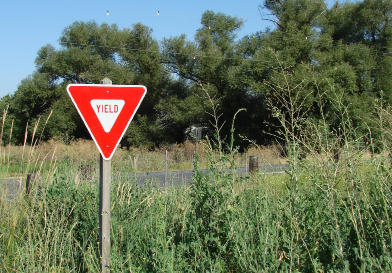Module 4
1. Module 4
1.6. Lesson 2
Module 4: Area
Lesson 2: Area Formulas
Focus

© J.D.S./shutterstock
Design is all about the shape of things. How is your Unit 2 Project shaping up?
Drivers know from the shape of traffic signs what each sign represents. Yield signs are triangular. Stop signs are octagonal. Information signs are rectangular. Most countries follow the same standards for shape, graphics, and colour. These standards make it easier for international travellers who may not speak the local language but will still know what the sign represents. In the United States and Canada, for instance, orange signs are used at construction sites.
Traffic signs are covered with a reflective coating, so they can be seen more easily at night and in low-lighting conditions. The amount of reflective coating used depends on the area of the sign. By the end of the lesson you should be able to determine the quantity of coating needed for the yield sign in the photograph.
Lesson Questions
In this lesson you will explore these questions:
- How are the areas of common shapes, such as parallelograms and triangles, calculated?
- How are the areas of composite shapes involving rectangles, squares, parallelograms, and triangles determined?
Assessment
You will complete the Lesson 2 Assignment Booklet for assessment. Download the Lesson 2 Assignment Booklet and save it in your course folder now. You will receive instructions on how to complete the Assignment Booklet later in the lesson. You will also be prompted to start working on the Unit 2 Project.
Remember to save all activities, including those that are not part of the Assignment, in your course folder.
Required Materials and Equipment
You will need the following supplies:
- a ruler or tape measure that shows imperial and SI units
- several sheets of quarter-inch grid paper (available in the course Toolkit)
- scissors
- tape
- a calculator